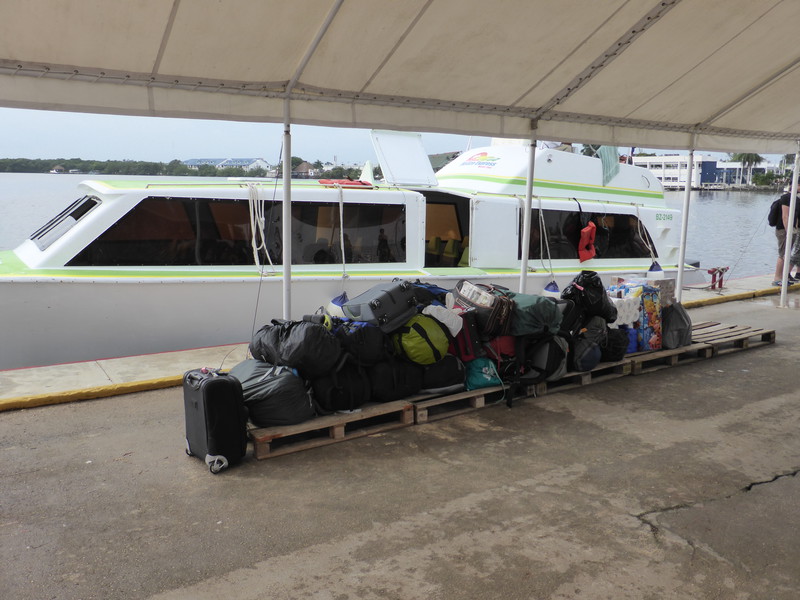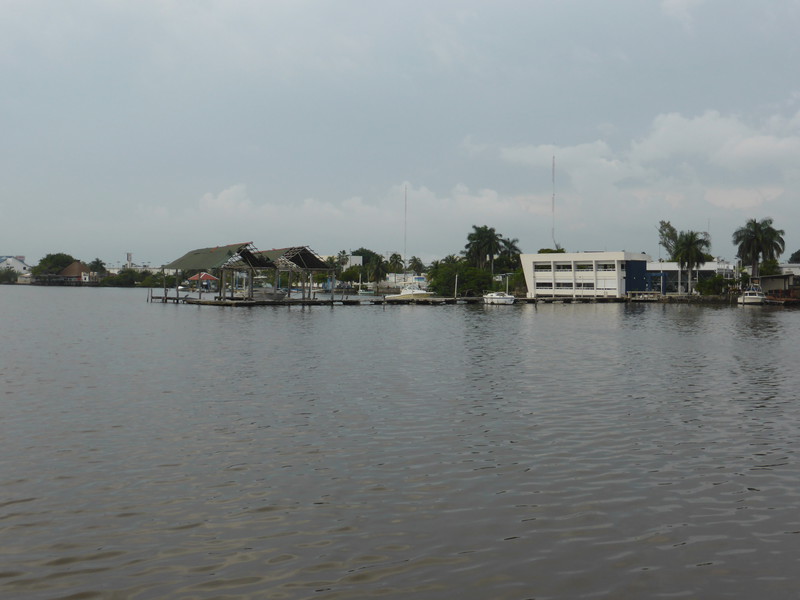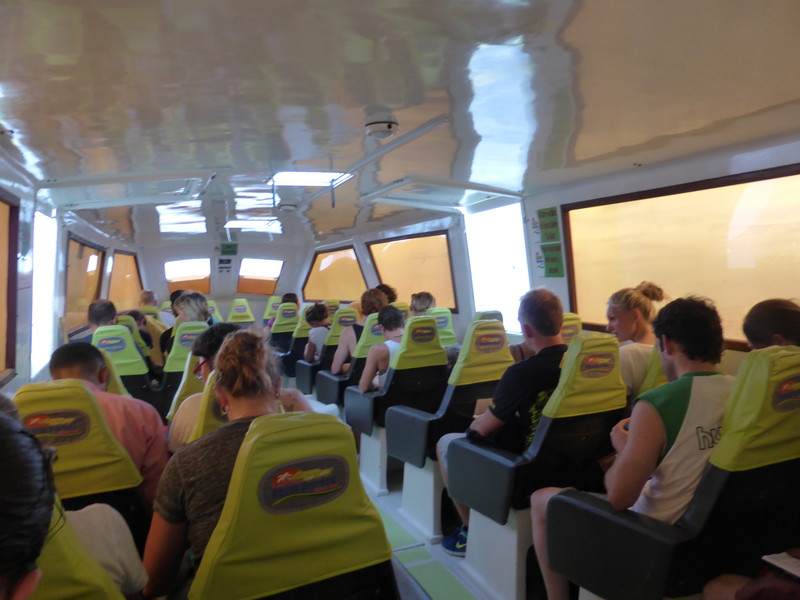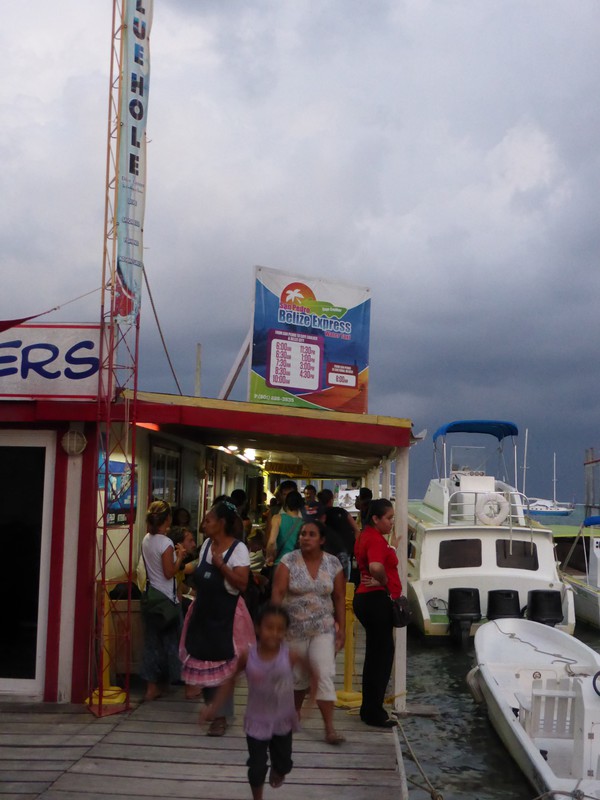
To be honest, I didn't have a clue how far we were going to get when we set off from Playa del Carmen in the general direction of Belize. I'd promised Peta that eventually we'd end up on the reportedly laid-back paradise island of Caye Caulker (pronounced 'key corker'), but that it might take a few long journeys to get there. I had visions of being trapped in dusty Mexican border towns, or stuck in a fleapit hotel room in Belize's infamously earthy capital city, waiting for a ferry to the northern islands; but I kept these visions to myself as we trudged to the bus station in Playa to catch the 7.20am bus for the border town of Chetumal.
The bus journey was uneventful, though as with all the first class buses in Mexico, we had to sit through a Spanish-language version of yet another Hollywood blockbuster (I can't even remember what the film was, and it was only a few hours ago, it was that engaging). On the way the heavens opened and the rain lashed against the windows so hard that even the windscreen wipers could hardly clear a view through the onslaught, though it did clear enough for us to see an overturned lorry that had jack-knifed onto the verge, ploughing a dark brown furrow into the surrounding forest where a pickup crane was trying to drag it into an upright position. The rain continued on and off all the way south to the border town of Chetumal, where we arrived in the bus terminal just a little before midday.

I knew that from Chetumal, there were apparently some boat services plying their trade to the northern cayes in Belize (cayes being low, sandy islands that form on top of coral reefs). But I didn't realise that they'd have a little kiosk in the bus station, where they sold tickets on the ferry to Caye Caulker via Ambergris Caye (pronounced 'am-bur-grease key'), departing from the port at 3pm, in plenty of time for us to catch. Even better, the man at the desk spoke good English and I had just enough pesos in my wallet to grab two tickets to Caye Caulker, and suddenly things were looking up; it looked as if we weren't going to have to go via Belize City after all, or make an overnight stop at Ambergris Caye. The man even wrote down the name of the ferry terminal in Spanish on the back of the ticket, so we could grab a taxi there by simply asking for muelle fiscal (or 'local pier'). This was all a bit too easy.
I had just enough Mexican money left in my wallet to grab a taxi, and as we pulled out of the bus terminal and shuddered off in the direction of the ferry, the heavens opened once more and water poured from the sky. The little Mexican driver squinted over his half-moon spectacles through windows that steamed up within seconds, and with one hand on the wheel and the other smearing the condensation into dirty streaks with a woefully inadequate cloth, he drove us through the streets of Chetumal, screeching to a halt at junctions where nobody seemed to know who had right of way, let alone who was coming straight at them out of the murk. Within minutes the roads had become canals and our taxi rode its own bow wave towards the port, though quite where the port began and Chetumal ended was no longer clear, and eventually we pulled up at a kerbside where a sign claimed that on the other side of a miniature lake was the office of the San Pedro Belize Express.

The taxi driver looked around at the steamy windows as the humidity in the cab rose past condensation point, pulled on a tired sweater and opened his door a fraction to see how deep the water was, and his expression said it all; we were effectively at sea, and he indicated that perhaps we should wait to see if the water was going to go down. This was kind of him, as he could have simply turfed us out at our destination, but after five minutes we figured that the rain wasn't going to give up and we were going to have to brave the storm surge, so we paid him his 50 pesos, jumped out into the ankle-deep torrent, grabbed our backpacks from the boot and sloshed our way to the pavement, where the water was only slightly shallower, but at least there was a small wall with a ledge that we could perch on while we got our bearings.
Luckily the water taxi office was open, so we put on our packs and jumped through the lake with giant astronaut-size leaps, eventually collapsing through the door to find a small group of other equally soaked travellers drying off in the relative shelter of the office. We were greeted by the friendly Belizean staff in Caribbean English, and it felt like we'd been rescued by Noah as I handed over our passports and the tickets we'd bought, and started filling in the immigration and customs forms for our entry into Belize.

Unfortunately, Mexico had one last curveball to throw at us before we could escape. As a UK citizen you don't need a visa to enter Mexico, and instead you get a little card inserted into your passport that's effectively a tourist visa, allowing you to stay for your allotted time. What they don't tell you – at least, not on the way in – is that this tourist visa is not free, and actually costs 295 pesos. Some airlines include the cost of this visa in their ticket price and some don't, so when you exit the country by land, you either have to prove that your air ticket into the country included the Mexican tourist visa charge, or you have to cough up 295 pesos in cash. The irritating thing is that in these modern days of e-tickets for flights, it isn't possible to prove from your standard air ticket email that you've already paid the visa fee as part of the ticket; instead you have to ask your airline or travel agent to send you a breakdown of all the taxes that are included in your ticket, so you can show this to the Mexican border police.
Our air ticket receipt said 'all taxes included', but that isn't enough; if it doesn't specifically mention the Mexican tourist visa fee, you have to pay, and the border guards have bigger guns and twitchier moustaches than most tourists, so you do what they say. So I had to wade out of the water taxi office, hop across the flooded but still busy dual carriageway like a renegade videogame character from the 1980s, and take out another fistful of pesos to hand over to the border police. Oh, and there was another 65 pesos of 'port tax' that we each had to pay as well, just for good measure, but after smiling through the whole thing with the good grace that you need to show to the man wielding The Power, we had our passports stamped and we were ready to go.
Out of the Frying Pan

Luckily the rain dried up soon after we'd jumped through all the fiery hoops of Mexican bureaucracy, and at about 2.30pm we were called over to a little 50-seater speedboat that was tucked away at the end of the pier. The crew laid out our luggage in a line on the dock while an army truck pulled up beside us and a group of burly Mexican soldiers jumped out with guns at the ready and casually cordoned us off at the end of the pier, and then they asked us to drop our hand luggage into a second line on the dock while one of the soldiers brought out a sniffer dog to go through everything. Up the line, down the line, back again and in and out went the dog, stopping every now and then to have a good poke around, though the only bit of drama was when an American we'd been chatting to pulled out his camera to snap the dog, and one of the soldiers cut him dead with an authoritative, 'Señor, no!' So, having passed the final test to exit Mexico, we climbed into the bowels of the boat and took our seats for the 90-minute ride to San Pedro on Ambergris Caye.
The journey was surprisingly smooth and fast, and by 5.30pm we'd arrived in Ambergris Caye, where we queued up for immigration on a ramshackle wooden pier and passed through customs with Caribbean smiles and happy hello's rather than the grimaces and gracias's of the Mexican border. This is perhaps not surprising, as Ambergris Caye is a bone fide Caribbean paradise island; the islanders claim that the caye was the subject of Madonna's 1987 song 'La Isla Bonita', which I've always thought is her best song until she matured into a proper artist with 1997's Ray of Light. Whether or not this is true is open to debate – the song name-checks San Pedro, which is the little town where we went through customs and immigration – but it hardly matters, because when the Queen of Pop sings 'Tropical the island breeze, all of nature wild and free, this is where I long to be, La Isla Bonita', you're with her all the way, irrespective of the facts.

Unfortunately this is still the tropics, and as we waited for everyone to pass through customs, the sky started rumbling and flashing in the distance. For those of us going on to Caye Caulker this wasn't such a good omen, as we still had another 30-minute boat journey south, right into the eye of the storm. As if on cue the sun dropped beneath the horizon in mere minutes, as it does when you're only 18 degrees north of the equator, and as we left port in the dark the first rains kicked in, forcing the crew to jump into the passenger cabin and batten down the hatches, while thunder clapped overhead. The boat windows were tinted a deep yellow, which was quite pleasant on the way over in the afternoon sunshine, but in the dark it meant that we were effectively cooped up in a small, claustrophobic cabin that jumped around as it smacked into the storm waves, and every few minutes the cabin would light up with hellish lightning flashes that left their spidery imprints on the backs of our eyes. It was so easy to imagine that we were crossing the Styx into hell that I instantly banished all thoughts of the afterlife to the back of my mind and went into the happy place that I built while sailing the south Pacific when we hit a storm in the roaring forties. Frankly, it was a relief to step out onto the dock at Caye Caulker and into torrential rain that instantly soaked me to the skin and turned my backpack into the subject of its own Olympic weightlifting category.

So we stood there, dripping wet, in the dark, on the end of a pier, on an island in a country we'd never visited before, with no accommodation booked, and no idea what to do. I was beginning to regret promising a Caribbean paradise to Peta as we stumbled onto the beach and into the path of a group of drunk American tourists.
'You look like you're dressed for Seattle,' said a slightly worse-for-wear man, wearing a T-shirt, shorts and a grin. 'Where you from?'
'London, England,' we said, adding the country because there are apparently 20 cities called London in America, and the accent isn't always enough for two and two to get it together in the beer-addled brain of a holidaying college boy.
'Woah, then you should be used to this,' he said, laughing a little too hard at his own joke. 'Doesn't matter though, this is paradise, even if it's raining. It's better than Ambergris, Ambergris is all stuck up, you'll be good here, loads of bars, go for it, it's fuckin' paradise, man! You go for it, London. Fuck yeah!'
And he stumbled off into the dark with his friends while we staggered up to the main road to try to find a hotel, weighed down by sodden packs and twelve hours of being on the move.
Adrian to the Rescue

There aren't any vehicles of note on Caye Caulker, but there are lots of golf buggies that are used for everything from taxis to tours, and within a few minutes of arriving at the main drag, we flagged one down.
'Hello, how you doing?' said a booming voice that oozed friendliness and warmth. 'Welcome to paradise. I must apologise for the weather, but sometimes it rains in paradise too. Now where are you good folks going?'
So we climbed into his golf buggy and told him we were looking for a hotel, and we showed him the shortlist we'd made from the places listed in the guidebook.
'Let me just pick up a box from the dock,' said the taxi man, 'and I'll ring a few of those for you, to see if they have spaces.' And after skidding down to the dock where a singing Rasta wandered past the buggy, proclaiming that Jah was good, the taxi man, who introduced himself as Adrian, started working his way through the list. One by one we found out that they were fully booked, or only had rooms for US$200 a night, a lot more than we'd been expecting to pay. He finally reached the last one on the list, which was just round the corner, so he spun away into the night and pulled up outside De Real Macaw Guesthouse, which appeared to be near to the shore in the northern part of the island (though in the darkness and pelting rain it was hard to see anything at all).
'We can manage three nights,' said the smiling lady in the hotel, and showed us three rooms that fit our budget perfectly; we picked the best room with a veranda overlooking what we were assured was the beach, gave Adrian US$5 for his help, and followed the lady's directions to the Rainbow Grill and Bar, where we drank Belikin Beer and ate fish fillets that were simply and properly cooked, rather than being smothered in tomatoes, cheese and chipotle and cremated in the Mexican manner.
'God, this tastes good,' said Peta as the nutrients flooded into our systems.
'It tastes like paradise,' I said, clinking her bottle with mine.
And the next day, as the sun rose in clear skies and shone on the beach outside our veranda, we realised that the drunk American was right, Adrian was right, and yes, we were right. Caye Caulker is indeed a little bit of paradise, and it was worth all the hellish storms to get here...